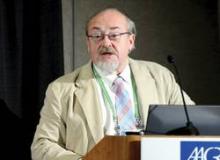SAN DIEGO – OTX015, an investigational agent that blocks the activity of bromodomain and extraterminal bromodomain proteins, demonstrated activity against a variety of hematologic cancers, preliminary results from a phase I trial demonstrated.
The finding is believed to be the first clinical proof that BET bromodomain inhibitors, a new class of anticancer agents that intervene with the down-regulation of the critical oncogene MYC may play a role in the treatment of human malignancies.
"We are seeing things that we did not expect to see," Dr. Esteban Cvitkovic, chief scientific officer of Lausanne, Switzerland–based OncoEthix, said during a press briefing at the annual meeting of the American Association for Cancer Research. OncoEthix is developing OTX015, an orally available molecule.
Dr. Cvitkovic presented findings from 42 patients with hematologic malignancies who were enrolled in a trial designed to determine the recommended dose and schedule of OTX015 to be given orally as a single agent. Of the 42 patients, 21 had acute leukemia – primarily acute myelogenous leukemia – and the remaining 21 had other hematologic malignancies, including diffuse large B-cell lymphoma and multiple myeloma. The researchers assigned study participants to a single dose of 10, 20, 40, or 80 mg of OTX015 daily, or to two 40-mg doses of OTX015 daily. Each dosing regimen included three to six patients with acute leukemia and three to six patients with another hematologic malignancy. The drug was administered in 21-day cycles, with a 14 days on, 7 days off regimen for acute leukemia patients and a continuous dosing regimen for patients with other hematologic malignancies.
The mean age of patients was 69 years and 60% were male. Complete data were available on 38 patients. Among these, the researchers observed significant clinical activity in seven patients: four with acute myelogenous leukemia (including one case of complete remission) and three with lymphoma. Of the seven patients, four received a single dose of 80 mg OTX015 daily, one received 10 mg daily, and the other two received 40 mg daily.
"The drug was very well tolerated, and half of the patients had at least three cycles [of the drug]," Dr. Cvitkovic said. Among acute leukemia patients, no dose-limiting toxicity was observed; the maximum tolerated dose was not reached at the 80-mg everyday or 40-mg b.i.d. doses.
Among patients with other hematologic malignancies, thrombocytopenia is emerging as a dose-related toxicity. "Thrombocytopenia is very peculiar, because as with this and any other adverse events, we stopped the drug and within 3 or 4 days everything went back to normal," Dr. Cvitkovic said. "Every adverse event is reversible upon discontinuation of the drug." Enrollment in the trial is continuing, and dose escalation with single doses of 120 mg OTX015 daily is being explored.
Other adverse events reported to date included increased blood glucose levels in previously diabetic patients, mild to moderate digestive symptoms, and declining platelet counts. No cumulative toxicity has been observed, Dr. Cvitkovic said.
"You look at cancer right now, and you look at tumors that are driven by c-Myc, RAS, RB, and p53," Dr. Thomas Lynch, director of the Yale Cancer Center, New Haven, Conn., said at the briefing. "Those are the four big actors in cancer, and we can do [nothing] for all of those major genetic abnormalities. If this approach works, and this is a way of targeting C-Myc or related genes, this would be a major breakthrough. If it works, it offers a [treatment for a] huge unmet medical need."
The study was supported by OncoEthix. Dr. Cvitkovic is chief scientific officer of the company. Dr. Lynch disclosed that he is on the board of directors for Bristol-Myers Squibb and Infinity Pharmaceuticals, and that he receives honoraria and stock from both companies. He is also on the scientific advisory board for Arvinas, and receives honoraria and stock from that company. In addition, Dr. Lynch is a patent holder with Partners Healthcare for an EGFR mutation testing patent and receives royalties.


